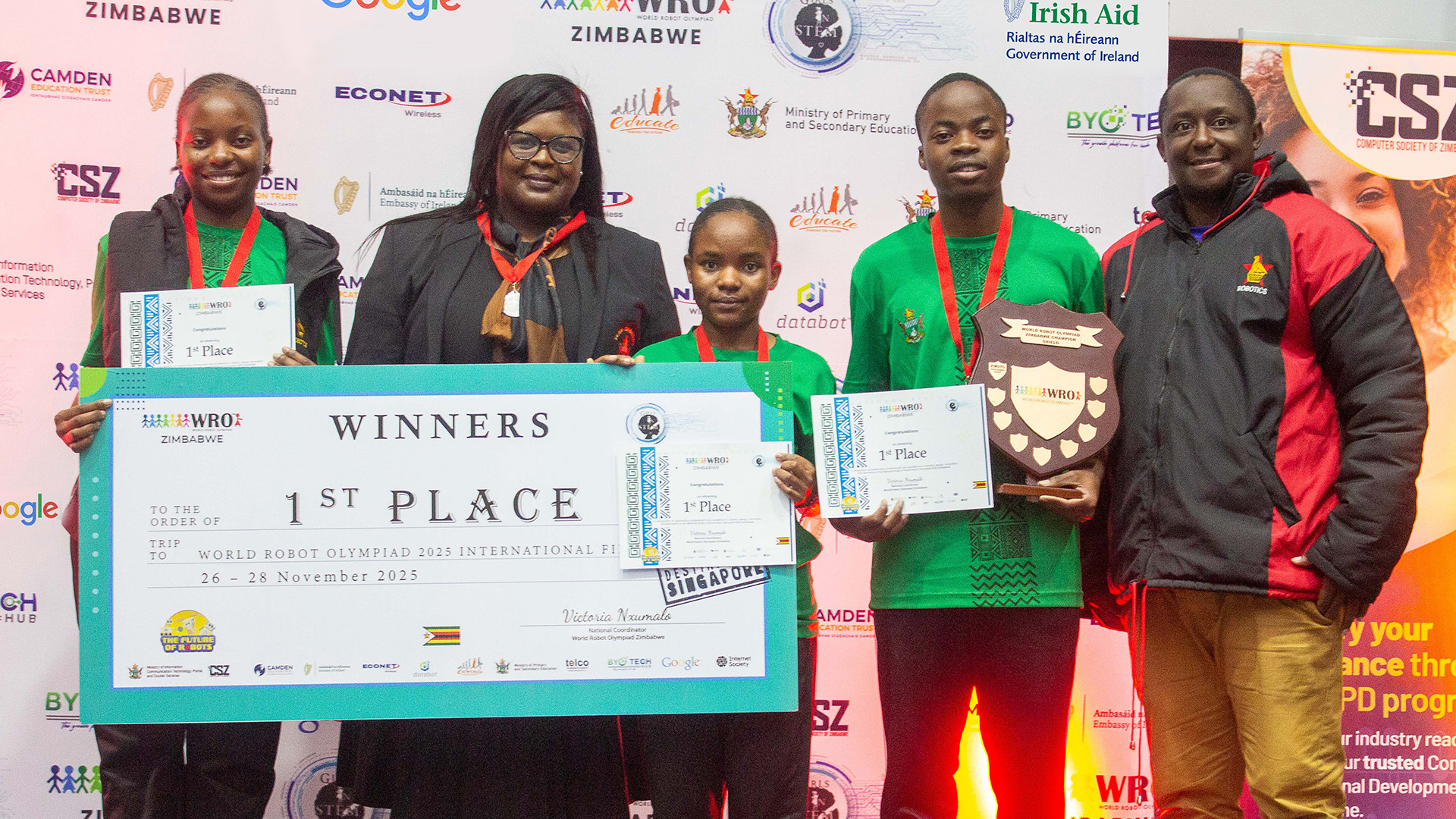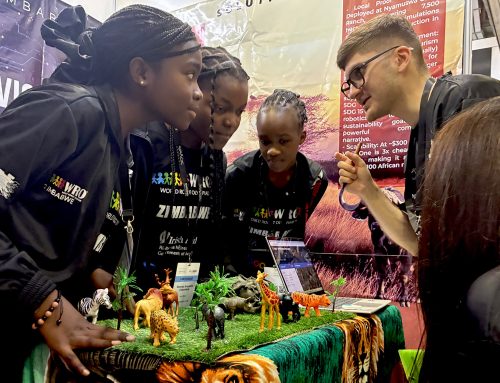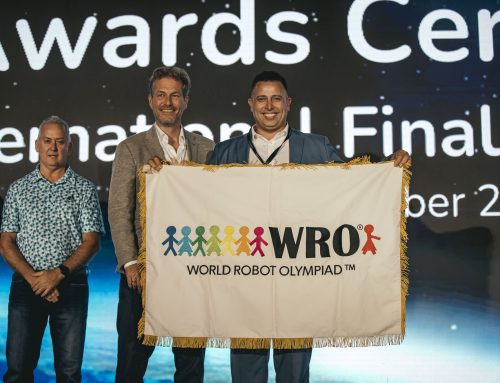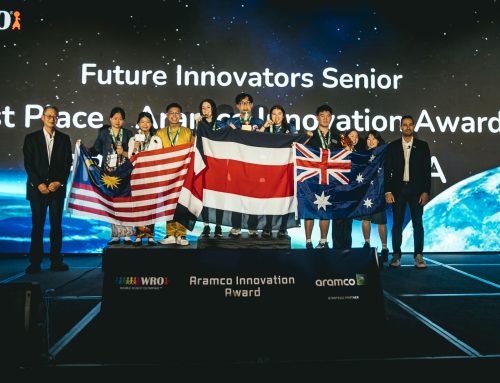Across the African continent in 2025, a quiet revolution is roaring to life, and it hums with the sounds of servo motors, sensor data, and student laughter. The World Robot Olympiad (WRO) competition has taken root in schools from Zimbabwe to Nigeria, South Africa to Uganda, building a movement that’s not just reshaping how kids learn, but redefining why they learn.
And it is gaining more traction. Ministries of Education, embassies, universities, and global partners like Google, the United Nations Economic Commission for Africa (UNECA) and the Endeavour Foundation are investing in this grassroots momentum, recognizing that the future education – and innovation – might just look like a table full of buzzing wires and bright ideas.
More than a Tech Competition
Each year, WRO invites students from around the world to imagine, build, and compete, all through the power of robotics. It starts in classrooms: robotics workshops and bootcamps unfold across schools, where students form teams and begin designing robots that respond to the year’s theme – this time, “The Future of Robots.” In some countries, regional events pave the way to national finals. Then, the top teams earn the chance to represent their country on the global stage in Singapore in November, alongside young peers from over 90 nations.
In Nigeria, South Africa, Uganda, Tanzania and Zimbabwe, WRO Bootcamps have reached schools across the country, introducing coding, AI, and engineering principles through play and challenge-based learning to hundreds of students – including those from underserved and special needs communities.
“Every robotics bootcamp is a window into what’s possible when learning becomes active, inclusive, and tech-driven,” says Valentine Masicha, WRO Country Coordinator for Uganda with Mindset Coders. “In these sessions, students aren’t just tinkering with robots; they’re building confidence, learning to collaborate, and solving real-world problems with code and creativity.” For many, it’s their first time seeing how STEM can be relevant to their lives and community.
Mentorship in Motion
In each participating country, the excitement is just as palpable among the coaches who are at the heart of the WRO experience.
“Gone are the days when teachers simply delivered content”, says Victoria Nxumalo, WRO Country Coordinator for Zimbabwe and founder of Girls in STEM Trust. “WRO is revealing what relevant, future-facing education looks like in real-time: a shift from instructors to co-creators — mentors guiding discovery with courage.”
Google mentor, software engineer, and WRO lead mentor Andrew Muriithi couldn’t agree more. His thing? Train WRO coaches to accompany students from their first brainstorming session all the way to proudly representing their country at the WRO International Final. “Mentorship isn’t about having all the answers. It is about walking the journey with someone. You grow just as much as the mentee does,” says Andrew.
He continues: “Start messy, learn fast. A mentee once asked me, ‘When do I know I’m ready to build real projects?’ My answer: You don’t. You just start. And remember that every expert you admire started with broken apps and endless errors.”
This evolution mirrors global shifts in education. The World Economic Forum’s 2023 “Education 4.0” agenda singles out mentorship, creativity, and adaptable problem-solving as foundational skills in an AI-first world. Meanwhile, UNESCO’s 2024 AI Competency Framework outlines 12 essential AI competencies for students – ranging from ethical reasoning to system design – with the goal of preparing learners to become responsible, human-centered co-creators of AI.
By introducing robotics, coding, and AI as tools for collaboration and creativity, WRO is creating safe spaces for experimentation and failure – and that’s where real learning happens. “WRO is the perfect launchpad for hands-on, trial-and-error learning,” Andrew explains. “In a world shaped by AI, it’s not just about getting it right. It’s about learning how to rethink, rebuild, and keep going. The problem-solving mindset these young people develop is exactly what the future needs.”

Team FutureSight from Milestone College (Manicaland Province), winners of the WRO Zimbabwe 2025 National Competition, Senior category, with their AI-powered voice assistant for the vision-impaired.
Meet the Makers: A Winning Team Up Close
In Manicaland Province, Zimbabwe, one WRO team captured the attention of judges, diplomats, and tech leaders alike.
Team FutureSight, winners of Zimbabwe’s National Championship in the Senior category, developed an AI-powered voice assistant for the blind. This smart, voice-controlled tool helps visually impaired users with daily tasks like reading, object recognition, and navigation. But what makes it truly special is its localisation: the team is adapting it to support local languages, ensuring accessibility for users who are often left behind in global tech developments.
“We wanted to build something that mattered,” said one team member. “Something that could make life better for people around us, not just win a trophy.”
This truth echoes in research, too: African youth often innovate with their community in mind, not a market. They consistently prioritize social impact over profit, seeking to solve real-world challenges like food access, clean energy, or equity in education (HSRC, 2024). This African mindset of ‘profit for purpose’ aligns powerfully with the spirit of WRO, where every robot tells the story that true innovation is transformational, not just transactional.”
With Africa’s workforce and innovation agenda at stake, Google and UNECA teamed up in 2024 to accelerate WRO’s spread across the continent, as Bahta Mamo Bekele, UNECA Program Coordinator and National Coordinator for WRO in Ethiopia, explains: “The WRO’s approach is fundamentally about building a vibrant African innovation ecosystem from the ground up. It empowers young people to tackle their communities’ most pressing challenges with their own hands and minds, giving them a voice that resonates far beyond their schools and cities. At the UNECA, we are witnessing this digital upskilling in action. It is inspiring a new generation of problem-solvers who are ready to own their narrative and shape the continent’s future.”
A New Era of Hands-on Learning
A growing body of educational research (e.g., OECD Future of Education 2030, Harvard Project Zero) confirms that interdisciplinary, collaborative, and values-based learning better prepares students for AI-rich futures than traditional subject silos.
More than a robotics competition, WRO is the new blackboard, the new lab coat, the new field trip. It becomes a testing ground for the kind of thinking machines can’t do: empathy, ethics, adaptability, and purpose. Yes, kids learn to code. But more importantly, they learn to connect ideas, people, and technology in meaningful ways.
“This is where education truly meets innovation in its truest form, robotics challenges becoming the new interdisciplinary classrooms, where math, science, and language meet creativity, cross-cultural teamwork, design thinking, and resilience. The skills forged here aren’t just nice-to-haves. They’re essential in an AI-powered world,” says Karen Bebelaar, WRO Program Manager.
And WRO Africa isn’t just nurturing future engineers, although it does that too. It is cultivating a generation of ethical innovators, systems thinkers, and global citizens who can lead with both skill and conscience.
Inclusion as a Power Engine
The smiles beaming from the Jangwani and Benjamin Mkapa schools in Dar es Salaam, Tanzania are spreading more good news backed by peer-reviewed evidence: educational robotics is a power mix of fun that significantly supports cognitive, social, and emotional development among learners with special needs.
A 2025 scoping review of 33 peer-reviewed studies confirmed significant gains in cognitive, emotional, and social development among learners with special needs engaged in robotics-based learning. One 2023 ERIC-reviewed study even showed that just eight weeks of robotics lessons led to improved mental planning and group interaction for children with Down syndrome.
But robotics isn’t just bridging gaps, it is opening new frontiers. Students with special needs actually help redefine what innovation looks like, their lived experiences bringing essential perspectives often missing from mainstream tech design.
“When children with disabilities build, code, and compete, they bring new ways of thinking to the table. Their contributions go beyond inclusion: they challenge design norms, foster empathy among peers, and drive user-centered innovation,” says Eva Shana, WRO Country Coordinator for Tanzania at the University of Dar es Salaam. Recent studies in inclusive tech design even highlight that co-creating with learners who have disabilities leads to more accessible, socially attuned technologies for all (GSSRR, 2023).
What’s in a WRO?
Far more than they imagined back in 2004, for sure.
What started as a robotics contest has evolved into a launchpad for equity, creativity, and human-centered innovation. In 2020, only 5 of the 90 participating countries were African. Last year, thanks to the unwavering support of partners like Google, UNECA, Irish Aid, Endeavour Foundation, Camden.education, and a growing network of local changemakers, 9,000 young people across 14 African countries took part in WRO activities – and with momentum building, even more are expected in 2025.
In Nigeria, strategic partnerships with state ministries and institutions are mainstreaming robotics across schools nationwide. The impact? Over 2,000 teachers trained and more than 20,000 young people from all walks of life engaged in WRO 2025.
“With WRO, students, coaches, and experts alike are being prepared today for the challenges of tomorrow. More than a competition, WRO is a launchpad raising solution-driven young people who can think differently, innovate locally, and function globally,” says Abisola Obasanya, WRO Nigeria National Organiser.
Some 4,000 miles further south, the sentiment is shared by WRO South Africa National Organiser Danie Heymans, who has just wrapped up 13 Provincial WRO events with Township Robotics, bringing key 21st-century skills to schools in historically underserved areas.
“In a world racing to automate, quantify, and scale, these fearless, ready-to-learn youth with their purpose-driven mindset remind us what real innovation looks like. And it looks a lot like Ubuntu*,” concludes Heymans.
*Ubuntu is an ancient African word rooted in humanist African philosophy and can be roughly translated as “humanity to others”, or “I am because we are”. It comes from the Zulu proverb “Umuntu ngumuntu ngabantu”, meaning “a person is a person through other people”.
Links:
- Follow the WRO in Africa journey on LinkedIn
and through Beyond the Bot – The Skill Behind the Thrill! - World Economic Forum’s 2023 “Education 4.0” agenda
- UNESCO’s 2024 AI Competency Framework
- HSRC, 2024
- OECD Future of Education 2030
- 2025 scoping review of 33 peer-reviewed studies
- 2023 ERIC-reviewed study
- GSSRR, 2023







